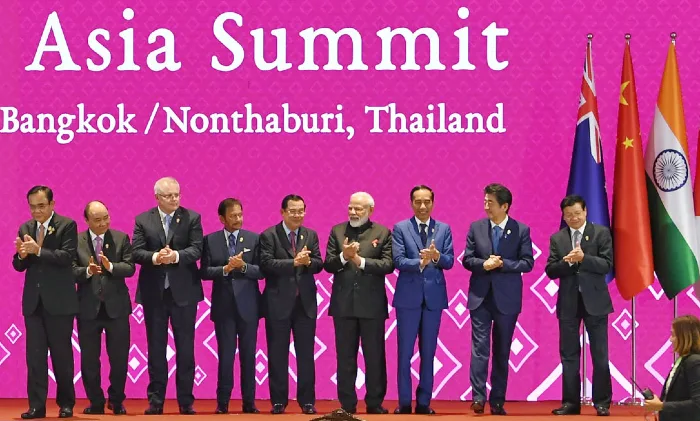Prime Minister Narendra Modi will today virtually address the 16th East Asia Summit, a premier leaders-led forum in the Indo-Pacific region.
According to the Ministry of External Affairs, the summit will discuss among other issues, maritime security, terrorism and Covid-19 collaborations.
Leaders are also expected to release declarations on mental health, economic recovery through tourism, as well as green recovery, which are being co-sponsored by India.
"India, being a founding member of the East Asia Summit, is committed to strengthening the East Asia Summit and making it more effective for dealing with contemporary challenges," the ministry said.
What is East Asia Summit?
The East Asia Summit (EAS) is the Indo-Pacific's premier forum for strategic dialogue.
At a time when countries from the United States to India, Japan and Australia have got together to ensure that the Indo-Pacific region remains "free and open" – and the United Kingdom is strengthening its partnership with India admitting its "tilt" to the Indo-Pacific – the EAS remains an important forum to advance closer regional cooperation.
Who participates?
Apart from the 10 ASEAN member states, the East Asia Summit includes eight other countries including India, China, Japan, South Korea, Australia, New Zealand, United States and Russia.
The 10 ASEAN countries are Brunei, Cambodia, Indonesia, Laos, Malaysia, Myanmar, the Philippines, Singapore, Thailand and Vietnam.
According to the Australian government, EAS members represented 54 per cent of the world's population and accounted for 62 per cent of global GDP worth an estimated US$52.3 trillion in 2020.
ASEAN leads the forum, and the chair position rotates between ASEAN member states annually.
What has the EAS achieved?
Since its inception – the inaugural EAS was held in Kuala Lumpur on December 14, 2005 – the summit has played a significant role in the strategic and geopolitical evolution of East Asia.
At the leader-led forum, the key partners discuss political, security and economic challenges facing the Indo-Pacific.
It is also an important platform for furthering practical cooperation in the Indo-Pacific by building upon the convergence between ASEAN Outlook on Indo-Pacific (AOIP) and Indo-Pacific Ocean's Initiative (IPOI).
What has been India's role at the East Asia Summit?
India's role has been that of a harmoniser, seeking common ground among member states which may have a divergent agenda.
India has always highlighted the importance of the East Asia Summit, especially when it comes to exchanging views on strategic issues, the importance of adhering to international law, respecting territorial integrity and sovereignty, and promoting a rules-based global order in the region.
Last year, while representing India at the summit, External Affairs Minister S Jaishankar had noted the growing interest in the Indo-Pacific as an integrated and organic maritime space, with ASEAN at its centre.
While appreciating the synergy between the ASEAN outlook and India's Indo-Pacific Oceans Initiative, the minister had said that New Delhi remains equally positive about the Indo-Pacific policies announced by other nations.
"Harmonizing various perspectives would never be a challenge if there is commitment to international cooperation," Jaishankar had said.
Regional and international issues such as the South China Sea, situation in Korean peninsula and Rakhine state were also discussed.
Jaishankar had expressed concern about actions and incidents in the South China Sea that erode trust in the region. He had stated that the Code of Conduct negotiations should not be prejudicial to legitimate interests of third parties and should be fully consistent with the United Nations Convention on the Law of the Sea (UNCLOS).
Also Read: Britain labels India as a 'like-minded' partner in push for closer military ties




















